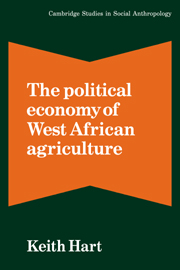Book contents
- Frontmatter
- Contents
- Acknowledgments
- 1 Introduction
- 2 West Africa's economic backwardness in anthropological perspective
- 3 The organization of agricultural production
- 4 The state in agricultural development
- 5 The market and capital in agricultural development
- 6 The social impact of commercial agriculture
- 7 What is to be done?
- Notes
- Select annotated bibliography
- Supplementary bibliography
- Index
- CAMBRIDGE STUDIES IN SOCIAL ANTHROPOLOGY
5 - The market and capital in agricultural development
Published online by Cambridge University Press: 29 September 2009
- Frontmatter
- Contents
- Acknowledgments
- 1 Introduction
- 2 West Africa's economic backwardness in anthropological perspective
- 3 The organization of agricultural production
- 4 The state in agricultural development
- 5 The market and capital in agricultural development
- 6 The social impact of commercial agriculture
- 7 What is to be done?
- Notes
- Select annotated bibliography
- Supplementary bibliography
- Index
- CAMBRIDGE STUDIES IN SOCIAL ANTHROPOLOGY
Summary
The problem of the future will be to deal with the native capitalists when they arise, as they will desire to oust the State from control of industry. This is the crux of the matter and it awaits determination.
Allan McPhee, The Economic Revolution in British West Africa (1971:280)If the problem of the state can be treated as a separate topic for analysis, it is rather more difficult to isolate the role of the market and capitalism in West Africa's agricultural development, because these issues pervade this whole book. So the present chapter is short and even less descriptive than most of the others. It addresses four issues: the central mechanism that has led to the explosion of commercial agriculture in the modern period; the organization of marketing and transport, which together have produced a commercial revolution in modern times; money, that is, the forms of wealth and capital accumulation; and the question whether proletarianization of rural labor has laid the grounds for an agrarian revolution along classical capitalist lines.
Why did West Africans produce for the world market?
I have already indicated that the market was a significant feature of West African economies before the modern period. It was restricted in its development, however, by the low density of population, high transport costs, the self-sufficiency of local agriculture, the high import content of effective demand, and the low degree of specialization in the division of labor.
- Type
- Chapter
- Information
- The Political Economy of West African Agriculture , pp. 110 - 120Publisher: Cambridge University PressPrint publication year: 1982
- 1
- Cited by



